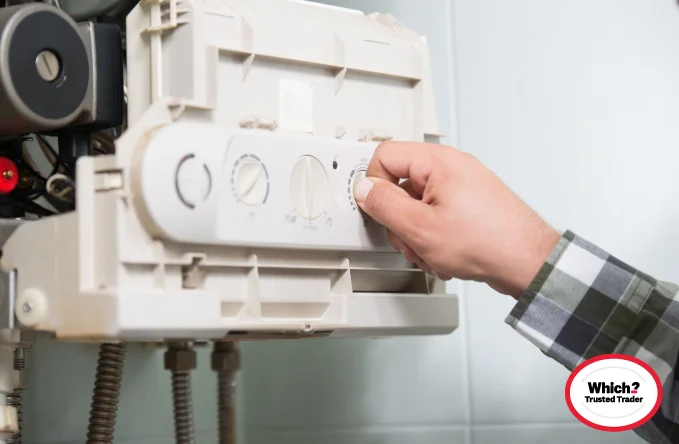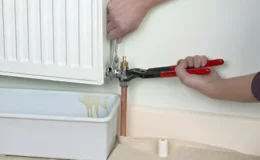
In this comprehensive guide, we'll cover everything you need to know about emergency boiler repairs, from recognising the signs of trouble to finding a professional boiler repair near you.
Signs of Common Boiler Problems
Sudden Loss of HeatThe most obvious sign that your boiler needs emergency attention is a sudden heat loss in your home. If you find yourself shivering despite the thermostat being set correctly, your boiler might be the culprit.
Unusual Noises
Strange noises like banging, rattling, or whistling from your boiler can indicate underlying issues. These noises should never be ignored, so take action for immediate repairs.
Pilot Light Problems
If your boiler has a pilot light, a persistent extinguishing of the flame or its colour changing from blue to yellow can be a sign of trouble. Also, if you can't ignite your boiler, debris might obstruct the jet. Boiler pilot light jets are cost-effective to replace but can also be cleaned and reinstalled. Consult your heating engineer for guidance on the most suitable solution; they will replace the jet as necessary.
Leaking or Dripping
Any signs of water leakage or dripping around your boiler should be treated as an emergency. It can signify a serious issue with the system. If you observe water dripping from a pipe connected to your boiler, it's crucial to identify the type of pipe before taking any action. Generally, plastic pipes are associated with the condenser, while copper pipes are typically used for pressure release. Remember that the condenser pipe might not be visible, as it often leads directly to your waste system. However, leaking water from your boiler overflow pipes can be due to improper pressure release valve fitting or high boiler pressure from an expansion vessel fault. If you observe such a leak, promptly contact a gas-safe engineer to come and check your boiler.
Immediate Steps to Take During Emergency Boiler Situation
 Turn Off the Boiler
Turn Off the Boiler In the event of a boiler emergency, your safety is paramount. Turn off the boiler and the gas supply immediately after suspecting a gas leak or any hazardous situation. This helps prevent potential disasters, including gas leaks, carbon monoxide poisoning, overheating, electrical hazards, etc. It allows for a safe evaluation of the problem and appropriate corrective actions to be taken. Moreover, Once the boiler is turned off, qualified engineers can safely inspect it to identify the cause of the emergency and make necessary repairs. Keeping it running during an emergency could hinder the assessment process and worsen the situation.
Ventilate the Area
If you smell gas or notice carbon monoxide symptoms (dizziness, nausea, headaches), evacuate your home immediately and ventilate the area by opening doors and windows. Call emergency services. Ventilating the room during boiler emergencies is a critical safety measure to disperse potentially harmful gases, protect against CO poisoning, ensure a fresh air supply, and reduce fire risk. It is an essential step in safeguarding the well-being of occupants and ensuring compliance with safety standards. Many building codes and safety regulations require proper ventilation in areas where combustion appliances like boilers are installed. In rare cases, boiler malfunctions can lead to gas fires. Adequate ventilation can help reduce fire risk by dispersing combustible gases or fumes. Therefore, Failure to ventilate adequately can result in violations and legal consequences.
Contact a Professional
Prompt action is crucial to prevent further damage and ensure a quick resolution. Contacting an emergency heating engineer near you during boiler repairs or emergencies is essential because these expert engineers possess the knowledge, training, and experience to:
Assess the Situation: They can quickly and accurately diagnose the plumbing/heating issue, identifying the root cause of the emergency.
Ensure Safety: Boiler emergencies can involve gas leaks, heating repairs, carbon monoxide risks, or fire hazards. Professionals know how to mitigate these dangers and protect occupants.
Prevent Further Damage: Immediate action can prevent minor issues from escalating into major, costly repairs or replacements.
Restore Functionality: Engineers have the expertise to repair the boiler, restoring its proper functioning efficiently.
Comply with Regulations: Professionals ensure that all repairs and installations adhere to safety and regulatory standards, avoiding potential legal issues.
Professional gas-safe engineers are indispensable during emergency boiler repairs because they guarantee safety, swift resolution, and adherence to standards, ultimately safeguarding both property and lives.Ready to Choose the Right Boiler Repair Service For You?
When seeking professional help for emergency boiler repairs, consider the following factors:Certifications: Ensure that the technician or company is Gas Safe registered and holds the necessary certifications.
Experience: Look for a service with a solid track record and extensive experience in boiler repair.
Response Time: In emergencies, response time is crucial. Opt for a service that can arrive promptly to assess the situation.
Transparent Pricing: Seek a service that provides transparent pricing and estimates so you know what to expect regarding costs.
Customer Reviews: Read customer reviews as well as their testimonials to gauge the company's service quality.
How to Prevent Future Boiler Emergencies?
Once your boiler emergency is resolved, taking preventive measures is vital to avoid future crises. Schedule regular boiler maintenance to keep your central heating system in top condition, and consider upgrading to a more energy-efficient model to reduce the risk of breakdowns.Here's an elaboration on key steps to avoid unexpected boiler issues:
- Regular Maintenance: As a homeowner or business owner, it's important to prioritise the maintenance of your boiler system. Scheduling annual or bi-annual professional maintenance with a certified heating engineer will ensure that your boiler (whether it's gas, combi, or electric) is inspected, cleaned, and tuned for optimal performance. This type of routine maintenance can not only improve efficiency but can also identify potential problems in the central heating system before they turn into major issues.
- Bleed Radiators: If you have a radiator system, bleeding radiators at least once a year release trapped air, ensuring efficient heat distribution and reducing strain on the boiler.
- Install Carbon Monoxide Detectors: Place CO detectors near your boiler, in sleeping areas, and in any room where a combustion appliance is. These devices can alert you to dangerous CO levels, allowing you to address issues before they become emergencies.
- Regular Cleaning: Keep the area around your boiler clean and free from dust and debris. A clean environment helps maintain proper airflow and reduces the risk of blockages.
- Use Quality Fuel: If you have an oil or gas boiler, use high-quality fuel from reputable sources. Low-quality fuel can lead to deposits and inefficiencies.
- Avoid Overloading: Don't overload your boiler with excessive demands, such as simultaneously running too many heating zones. It can strain the boiler and increase the risk of breakdowns.
- Invest in Boiler Controls: Consider installing modern boiler controls and thermostats for efficient scheduling and temperature adjustments. Smart thermostats can optimise your boiler's performance.
- Insulate Pipes: Insulating exposed pipes prevents freezing during cold weather, reducing the risk of pipe bursts and damage to the boiler.
- Address Leaks Promptly: Take immediate action if you notice water leaks or drips around the boiler. Leaks can lead to corrosion and further damage if left unattended. It's not something you can take care of. Call emergency service support immediately.
- Regularly Check for Corrosion: It is essential to check your boiler for signs of corrosion regularly. Not only will it prevent expensive repairs, but also ensure your safety. Corrosion on the exterior of the boilers can lead to the accumulation of rust or even leaks. Therefore, promptly addressing any signs of corrosion promptly is crucial to prevent it from spreading.
- Stay Informed: Educate yourself about your boiler type and maintenance/servicing requirements. Understanding how your boilers work empowers you to identify issues early.
Understanding the signs of a boiler emergency, taking immediate steps when needed, and choosing the right heating professionals are all essential to dealing with unexpected issues in boilers. By staying informed and proactive, you can ensure that your home remains warm and comfortable, even when facing the chill of a boiler emergency in London. Remember, safety always comes first in these situations, so don't hesitate to call for a professional boiler repair near you when needed.
Emergency Boiler Repair Service in London

If you are based in London or the surrounding areas, you can call our central heating engineers to get your boiler inspected. Serviceteam heating professionals in London will provide the necessary repair or installation services to keep your boiler and central heating system functioning optimally. Don't overlook the importance of boiler servicing and repairs; book a serviceteam gas-safe engineer or call our help desk to keep your central heating system running at its best.
Let our engineers take care of your boiler system so you can have peace of mind knowing it's in good hands.






